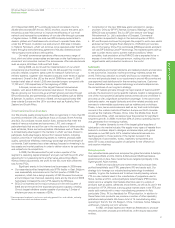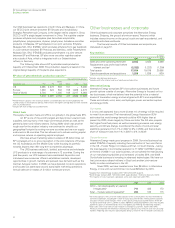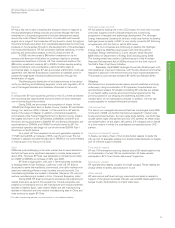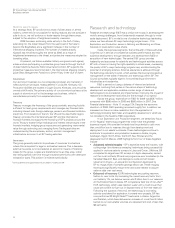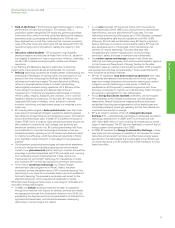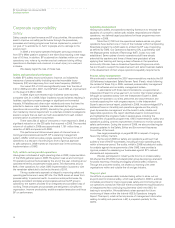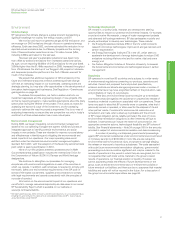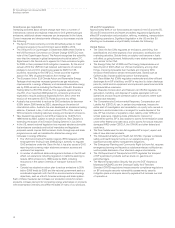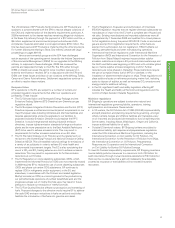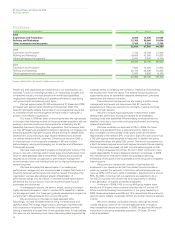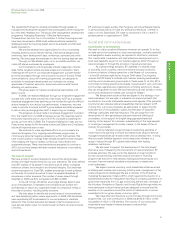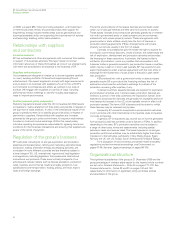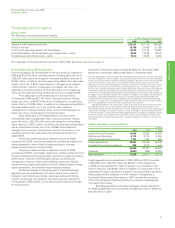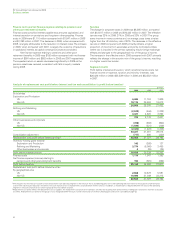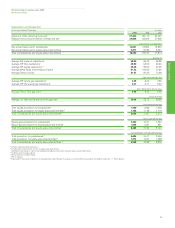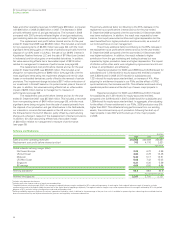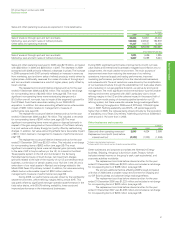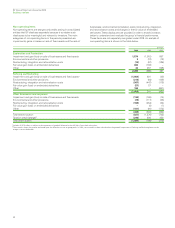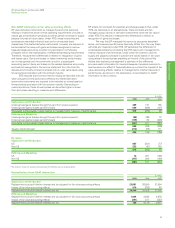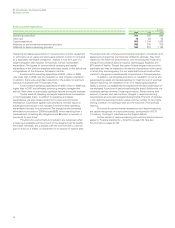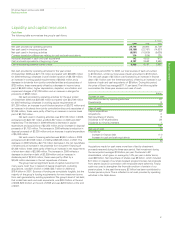BP 2009 Annual Report Download - page 53
Download and view the complete annual report
Please find page 53 of the 2009 BP annual report below. You can navigate through the pages in the report by either clicking on the pages listed below, or by using the keyword search tool below to find specific information within the annual report.
51
BP Annual Report and Accounts 2009
Business review
The Leadership Framework is being embedded through access to
management development programmes and progress will be measured
by a new 360° feedback tool. The group-wide management development
programme, Managing Essentials – Effective Performance
Conversations, has now run in 41 countries. A further five programmes
have been developed in 2009 which address particular leadership
challenges faced by the group leader, senior level leader and first level
leader populations.
We provide development opportunities for all our employees,
including external and on-the-job training, international assignments,
mentoring, team development days, workshops, seminars and online
learning. We encourage all employees to take five training days per year.
Through our ShareMatch plan, run in around 65 countries, we
match BP shares purchased by employees.
Communications with employees include magazines, intranet
sites, DVDs, targeted emails and face-to-face communication. Team
meetings are the core of our employee engagement, complemented
by formal processes through works councils in parts of Europe. These
communications, along with training programmes, are designed to
contribute to employee development and motivation by raising
awareness of financial, economic, social and environmental factors
affecting our performance.
The group seeks to maintain constructive relationships with
labour unions.
In 2008, we received feedback through our employee engagement
surveys that, while there was still very high loyalty to BP as a company,
employee engagement was declining as we worked through the difficult
actions needed to turn around our performance. In response, we have
made it a priority to ensure that BP’s group leaders are better equipped
to tell our story and engage their staff in supporting our strategy.
The progress we have made in employee engagement is evident
from the results from our 2009 employee survey. The response rate for
the survey improved year on year with 57% of people completing the
survey, up from 42% in 2008. The Employee Satisfaction Index and our
Pulse survey scores for Performance culture and Safety and Compliance
culture all improved year on year.
We continue to make significant efforts to communicate the
intent and progress of our ongoing cost-efficiency programmes, to
minimize any potential negative perceptions within the business. We
have moved quickly to manage these people and performance changes
while keeping the focus on safety, continuous improvement and
sustainable change. These improvements are expected to continue in
2010, but we have already delivered material reductions in complexity,
cost and headcount.
The code of conduct
We have a code of conduct designed to ensure that all employees
comply with legal requirements and our own standards. The code defines
what BP expects of its people in key areas such as safety, workplace
behaviour, bribery and corruption and financial integrity. Our employee
concerns programme, OpenTalk, enables employees to seek guidance
on the code of conduct as well as to report suspected breaches of
compliance or other concerns. The number of cases raised through
OpenTalk in 2009 was 874, compared with 925 in 2008.
In the US, former US district court judge Stanley Sporkin acts
as an ombudsperson. Employees and contractors can contact him
confidentially to report any suspected breach of compliance, ethics or
the code of conduct, including safety concerns.
We take steps to identify and correct areas of non-compliance
and take disciplinary action where appropriate. In 2009, 524 dismissals
were reported by BP’s businesses for non-compliance or unethical
behaviour. This number excludes dismissals of staff employed at our
retail service station sites, for incidents such as thefts of small amounts
of money.
BP continues to apply a policy that the group will not participate directly
in party political activity or make any political contributions, whether in
cash or in kind. Specifically, BP made no donations to UK or other EU
political parties or organizations in 2009.
Social and community issues
Contributing to communities
We seek to make a positive difference wherever we operate. To do this,
we take action that is relevant to local circumstances, mutually beneficial
and designed to create enduring, as opposed to short-term, solutions.
Our investments in education and local enterprise development aim to
build local capability as part of our business agenda, either through our
local employees or through the provision of goods and services.
As a global energy company, BP operates in a diverse range
of countries and in a variety of environmental and social conditions.
A common feature of these operations is the lifespan of our projects
– some BP projects might last as long as 30-40 years. This longevity
requires that BP seeks to cultivate and maintain enduring relationships
with the communities and governments in these areas. To do this, BP is
committed to finding solutions that create mutual benefit: work with local
communities, agencies and organizations on finding solutions to issues
that can bring benefit to both the local operations as well as help to meet
community development needs over a project’s lifespan.
We always seek solutions that are aligned to the strategy of our
local businesses. For example, in education we support projects that
contribute to the wider sustainable development agenda of the particular
country but also develop skills and capabilities that are relevant to BP.
In doing this, we involve ourselves, as appropriate, in supporting the
enhancement of the availability, quality and relevance of education
offerings, particularly technical education. This can range from the
development of new geo-science and petro-technical offerings at
universities, to the support for English language-based technical
training, to the support for a broader understanding of the legal aspects
of oil and gas management for policy makers, to the basics of the oil
industry for journalists.
In some instances we get involved in supporting elements of
macro-economic planning to ensure that issues such as good revenue
management practices can enable wider national development. In doing
this we usually facilitate access to world class policy thinkers on a
range of issues through BP’s global relationships with leading
education institutions.
We also seek to support the development of the local supply
chain as a way of deepening the involvement of local enterprise in BP
business activities. The way we do this depends on local conditions
but can include training, business advisory services or financing
programmes that aim to help develop existing business products and
services, improve internal standards and practices, or create new
small enterprises.
We support various voluntary, multi-stakeholder initiatives aimed
at sharing best practice and improving industry-wide management of key
social and economic challenges. We are a member of the Extractive
Industries Transparency Initiative (EITI), which supports the creation of a
standardized process for transparent reporting of company payments and
government revenues from oil, gas and mining. We are also members of
the Voluntary Principles on Security and Human Rights through which we
have developed a robust internal process designed to ensure that the
security of our operations around the world is maintained in a manner
consistent with our group stance on human rights.
We make direct contributions to communities through community
programmes. Our total contribution in 2009 was $106.8 million, which
included $1.3 million to UK charities. The majority of our community
expenditure was directed towards education and technical
training projects.
Business review
Business review


